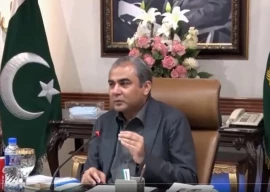
It is crucial, now more than ever, that steps are taken for water and energy security in Pakistan, else the consequences will be severe.
Experts stated this at a conference on “Water and Energy Security in Pakistan: The Way Forward” organized by the Islamabad Policy Research Institute (IPRI) on Thursday, said a press release issued by the institute.
Sustainable Development Policy Institute (SDPI) Deputy Executive Director Dr Vaqar Ahmed said that poor governance and absence of practical and dynamic policy framework pertaining to the energy sector are the major reasons for the chaotic energy situation in Pakistan.
He said while primary energy consumption in the country has grown by 80 per cent, the situation has worsened due to the government’s poor policy framework. He said mismanagement in the energy sector has created a rift between the provinces and the centre, adding that if action is not taken now, the economy will not be able to withstand the fallout.
Ahmed said energy governance is crucial at this time and to accomplish that governing boards need to be allowed to work independently, regulatory bodies’ oversight strengthened and appropriate legislative changes taken to allow deregulation.
He said that energy pricing was another aspect that needs consideration, suggesting that subsidies in the sector should be phased out and prices should be determined on an economic basis.
He also lamented that there was not a single consumer specialist in Pakistan, while in India there are 76 such specialists. Lack of demand-side accountability and project-specific legal/institutional arrangements were other important considerations, he said.
Highlighting long-term solutions, Ahmed said that energy crisis can be dealt with by developing a national consensus on hydro and coal sources, establishing a multi-buyer and multi-seller private sector energy market, insulating the gas sector from security threats and increasing the capacity for renewable energy.

Ahmed emphasized on joint techno-economic evaluation of opportunities and determination of prerequisites to improve the energy situation in the country. He suggested seeking support from multilateral institutions, particularly the Southern Africa Power Pool and Nordel, and electricity trade in Europe.
He suggested that hat there should be only one ministry for the energy sector so that things could be aligned under one authority. He added that the large-scale theft of electricity was being done by “the big fish.”
A researcher, Dr Shaheen Akhtar, said Pakistan needed to follow a holistic water resource management strategy to deal with internal and trans-boundary water issues.
She said that Pakistan is a single basin country and its dependence on external water resources was 76 per cent, while that of India is 34 per cent, adding that rising water demand in the two countries are creating trans-boundary issues as well as internal conflicts.
Akhtar said Pakistan must manage its domestic water resources, as a huge amount of water is consumed by its agricultural sector. She said that inefficient irrigation techniques have led to a sharp decline in groundwater level and as a result various wetlands have been wiped out.

The researcher stressed that both India and Pakistan need to work together to monitor and forecast weather changes in the glacial region and the catchments of the upper Indus basin to meet the challenge.
Melting of the Hindu Kush-Karakoram-Himalaya (HKH) glaciers would have serious consequences for the Indus basin, warned Akhtar. She maintained that climate change is a major global threat and key gaps in the knowledge base of the Indus basin should be researched and made public.
IPRI Researcher Mustansar H Billah, called for shifting focus to renewable energy sources. He said though the potential of nuclear energy should not be abandoned, it would require high standard of security to ensure energy production. Moreover, he said Pakistan should not attach high hopes to coal for power generation due to its poor quality. He suggested that focus should be on hydropower.
Though a scientist from the audience pointed out that using coal for electricity generation is cheaper as it is an affordable source and can also be imported, Billah insisted that Pakistan can benefit from technological advancements in renewable energy sources, such as solar and wind, as is India, China and European countries.
He said that Pakistan should step up its efforts to accord with Iran on TAPI gas pipeline in order to meet the challenge of energy shortage.
One of the participants commented, “Problem lies within us,” saying that poor governance and incompatible strategy framework that fails to include all stakeholders in the process of energy generation and consumption.
Published in The Express Tribune, December 21st, 2012.




















































COMMENTS
Comments are moderated and generally will be posted if they are on-topic and not abusive.
For more information, please see our Comments FAQ